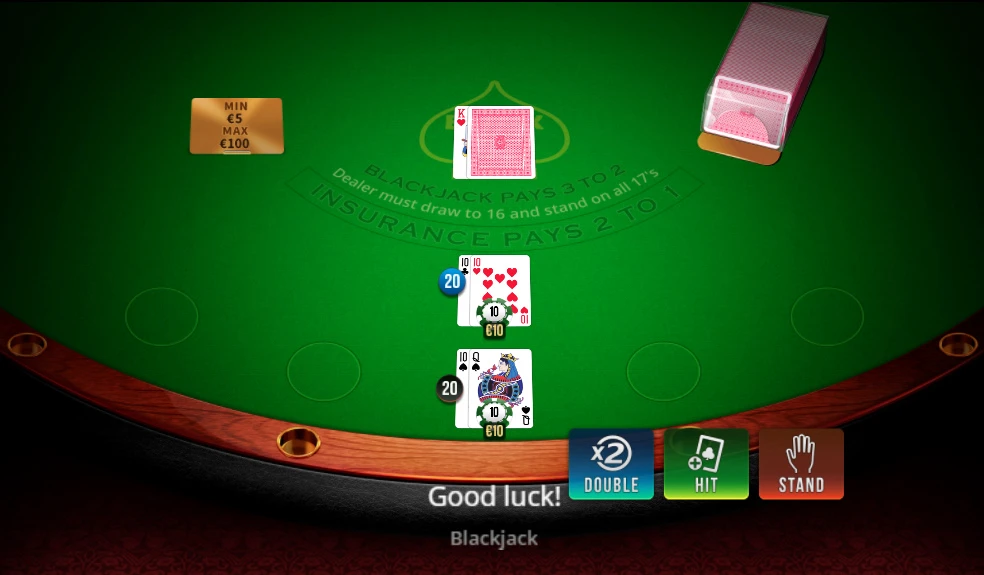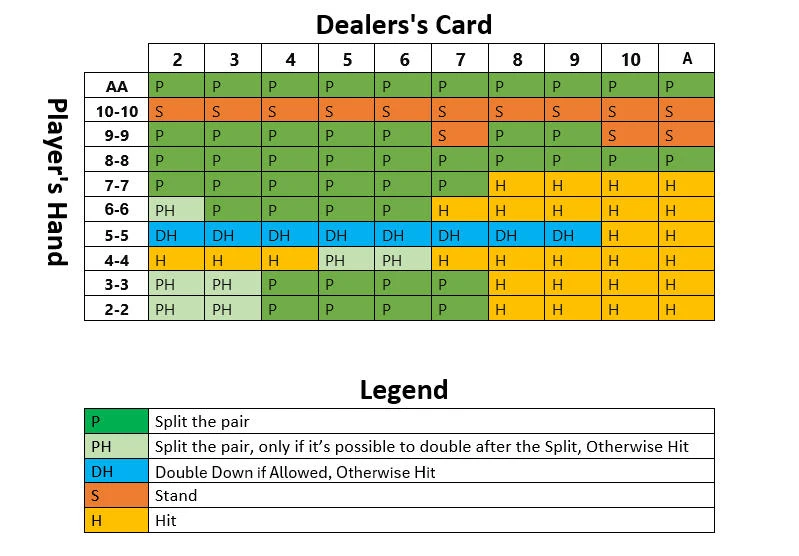
When To Split in Blackjack?

What does Split mean in Blackjack?
Blackjack splitting is a strategic move in the game of blackjack that can significantly impact your chances of winning. In blackjack, a split occurs when you are dealt two cards of the same rank, such as two 8s or two Aces, and you choose to split them into two separate hands. This move is referred to as "splitting" because you are dividing one hand into two, each with its bet equal to the original. Splitting allows you to potentially maximize your winnings by playing two hands simultaneously, each with a new card drawn from the deck. The decision to split can depend on various factors, including the dealer's upcard, and is a crucial part of the blackjack strategy.
Rules of Split Blackjack
Understanding the rules of blackjack splitting is essential for effectively incorporating this strategy into your gameplay. Here are the basic rules and additional considerations:
Basic Rules
- Only if you have a pair: You can only split cards of the same rank (e.g., two 8s or two aces).
- Additional bet: You must place an additional bet equal to your original bet on the new hand.
- Dealing New Cards: Once you split your pair, the dealer will deal an additional card to each of the split hands, creating two separate hands to play.
- Playing Each Hand: You will then proceed to play each hand one at a time, following the standard rules of blackjack. You can choose to hit, stand, double down (if allowed), or even re-split (if allowed) based on the cards you receive.
- Winning or Losing: Each of the split hands is treated independently when determining wins or losses. You could win one hand and lose the other, win both, or lose both, depending on the cards dealt and the dealer's hand.
Is it possible to re-split several times?
In many casinos, you are allowed to re-split if you draw another pair of the same rank after the initial split. This means if you split two 8s and draw another 8, you can split again, creating up to four separate hands. However, the rules can vary, so it's important to check the specific casino policies.
In some casinos, it is forbidden to re-split Aces. In others, there is a re-split limit (usually from one to three). Unlimited re-splits are quite rare. In the Atlantic City Blackjack variant, it is possible to resplit up to three times.
Is it possible to double down after a split?
Some casinos allow you to double down on one or both hands after a split. This means you can double your bet and receive only one more card on each split hand. This rule can significantly increase your potential winnings, but, as with re-splitting, it depends on the casino's specific rules.
Does the Dealer Have the Right to Split?
In standard blackjack, only the players have the right to split pairs. The dealer does not have the option to split their hand. The dealer must follow predetermined rules, which typically involve standing on 17 or above and hitting on 16 or below, without any option for splitting pairs.
Example of a game sequence with a split on a pair of AS
Initial Hand:
- The player is dealt two Aces (A♠ A♦).
- The dealer's upcard is a 6 (6♣).
Action:
- The player decides to split the Aces into two separate hands.
- The player places an additional bet equal to the original bet.
New Hands:
- First hand: A♠
- The dealer deals a 7 (7♠) to the first hand.
- The player decides to stand with a total of 18.
- Second hand: A♦
- The dealer deals a 9 (9♥) to the second hand.
- The player decides to stand with a total of 20.
Dealer's Play:
- Dealer's hand: 6♣
- The dealer reveals the hole card, which is a 10 (10♦), giving the dealer a total of 16.
- The dealer must hit and draw a 5 (5♠), making the dealer's total 21.
Result:
- First hand: 18 loses to the dealer's 21.
- Second hand: 20 loses to the dealer's 21.
Pairs to Always / Never Split
Certain pairs in blackjack are almost always worth splitting because they offer the best chance to maximize your winnings or minimize your losses. Just as there are pairs you should always split, there are pairs that you should never split due to the unfavourable odds they have.
Pairs Always to Split
- Aces (AA): Splitting aces allows you to start two hands with a strong foundation of 11, which can potentially lead to two hands of 21 with a single additional card each. Given the high probability of drawing a 10-valued card next, splitting aces is almost always advantageous.
- Eights (88): Splitting eights is crucial because a total of 16 is a weak hand, with a high chance of busting if you hit and a low chance of winning if you stand. By splitting eights, you start two hands with 8, which gives you a better chance of improving each hand with subsequent cards.
Pairs Never to Split
- Tens (10-10): A pair of tens totals 20, which is a very strong hand in blackjack. Splitting tens would break up this strong hand, making it highly unlikely to achieve two equally strong hands and increasing your risk of losing.
- Fives (5-5): A pair of fives totals 10, which is an excellent starting point for doubling down. Splitting fives would turn a potentially strong hand into two weaker ones, reducing your chances of winning. In this case consider double down, unless the dealer's face card is a value greater than 8.
- Fours (4-4): A pair of fours totals 8, which is not a strong starting hand. However, splitting them often results in two weak hands with lower chances of improving significantly. It’s usually better to hit and try to improve the total of 8 rather than splitting.
Blackjack Split Chart: When to Split?
This chart, based on a blackjack game played with 4 to 8 decks where the dealer stands on all 17s, summarizes what has been explained before, and allows you to have an idea of the situations in which the split is recommended or to be avoided.

Apart from these hands where splitting is always or never recommended, there are hands where it is case by case, and where it depends on the dealer's visible card, this chart allows you to make the best decision.
Advantages and Disadvantages of Splitting
Splitting in blackjack can be a powerful strategy when used correctly, but it also comes with its own set of pros and cons. Understanding these can help you make better decisions during the game.
Advantages
- Increased Win Potential: Splitting allows you to turn a potentially weak or mediocre hand into two stronger hands. This can significantly increase your chances of winning more money in a single round, especially if you split aces or eights.
- Enhanced Flexibility: By splitting pairs, you gain the flexibility to play two separate hands according to the situation, potentially doubling your opportunities to beat the dealer. This is particularly advantageous if you’re dealt a pair of 8s, turning a poor total of 16 into two hands starting with 8 each.
- Maximized Bets: When splitting, you place an additional bet equal to your original wager, which can lead to higher payouts if both hands win. This aspect of splitting can be particularly profitable in favourable situations.
Disadvantages
- Increased Risk: Splitting requires you to double your initial bet, which increases the amount of money at risk. If the dealer ends up with a strong hand, you could lose twice the amount you initially wagered.
- Complex Decision-Making: Deciding when to split can be complex and requires a solid understanding of blackjack strategy. Making the wrong decision can turn potential gains into losses, especially if you split in situations where it’s not advantageous.
- Variable Rules: The splitting rules can vary between casinos, with some allowing re-splits and double downs after splits, while others do not. This variability can affect the overall effectiveness of splitting as a strategy and may limit your options depending on where you play.
Our opinion on the split in Blackjack:
Incorporating the split strategy into your blackjack gameplay can be a powerful tool to maximize your win potential, especially when dealing with pairs like aces and eights. However, while the advantages of splitting can be significant, it's important to be aware of its limitations. The increased risk and the need for precise decision-making can make splitting a double-edged sword.
In my opinion, while splitting can be highly beneficial, it should be used judiciously and always with a solid understanding of blackjack strategy and the specific rules of the game. Over-reliance on splitting without considering the broader context can lead to unnecessary losses, so it’s essential to balance this strategy with caution and experience.

Author
Manager
